Highlights
- Kubernetes remains the backbone of DevOps and cloud-native ecosystems, powering infrastructures from startups to global enterprises.
- CNCF (Cloud Native Computing Foundation) governs all official Kubernetes certifications and ensures global recognition and regular updates.
- Certifications validate real-world, practical Kubernetes skills, not just theoretical knowledge.
- Top certifications and their focus:
- KCNA - Foundational knowledge of Kubernetes and cloud-native tools.
- CKA - Cluster operations, troubleshooting, and administration.
- CKAD - Application deployment and management inside Kubernetes.
- KCSA - Core Kubernetes and cloud-native security concepts.
- CKS - Advanced Kubernetes security and compliance.
- CNCF Kubestronaut Journey connects all certifications in a structured learning path:
KCNA → KCSA → CKA → CKAD → CKS - Why these certifications matter in 2025:
- Boost career credibility in DevOps, Cloud, and SRE roles.
- Prove hands-on, production-grade Kubernetes expertise.
- Keep your skills relevant in the fast-evolving container ecosystem.
- Hands-on practice is key - exams like CKA, CKAD, and CKS are fully performance-based.
- KodeKloud offers real Kubernetes labs, mock exams, and guided learning aligned with CNCF exams.
- Common preparation tips:
- Start with KCNA or KCSA for fundamentals.
- Practice in real clusters (not just theory).
- Use timed mock exams to improve speed.
- Master YAML,
kubectl, and official documentation.
- Avoid common mistakes: skipping practice, poor time management, memorizing commands, ignoring security, or delaying exam scheduling.
- Certifications open doors to DevOps, cloud, and security-focused roles - from beginners to advanced professionals.
- Future outlook: CNCF is expected to expand certifications into FinOps, multi-cluster management, and AI-driven (AIOps) areas.
Introduction - Why Kubernetes Certifications Matter in 2025
Kubernetes has become the heart of modern cloud-native and DevOps ecosystems. From startups to global enterprises, nearly every tech-driven company now runs part of its infrastructure on Kubernetes - and that makes certified Kubernetes professionals more valuable than ever.
In 2025, earning a Kubernetes certification is one of the smartest career moves you can make. These certifications, issued by the Cloud Native Computing Foundation (CNCF), prove that you have real knowledge of how Kubernetes works and how it’s used in the real world.
Each certification focuses on a different skill level and career path:
- KCNA and KCSA use multiple-choice questions to test your understanding of core and security concepts.
- CKA, CKAD, and CKS are hands-on, practical exams that measure how well you can configure, troubleshoot, and secure real Kubernetes clusters.
Whether you’re aiming to break into DevOps, level up as a developer, or specialize in Kubernetes security, there’s a certification that matches your journey.
💡 New to Kubernetes? Start with our Kubernetes Tutorial for Beginners 2025 to get comfortable with the basics before choosing your certification path.
The CNCF and Its Role in Kubernetes Certifications
Behind every official Kubernetes certification stands the Cloud Native Computing Foundation (CNCF) - the open-source organization that maintains Kubernetes and many of the world’s most popular cloud-native tools, including Prometheus, Helm, and Envoy.
The CNCF’s mission is simple: to build a vendor-neutral ecosystem where cloud-native innovation can thrive. This open approach has made Kubernetes the backbone of modern DevOps and container orchestration.
When you earn a CNCF certification, you’re not just getting a credential - you’re validating your skills against the official global standard for Kubernetes professionals. That’s why these certifications are recognized and respected by companies of all sizes, from startups to cloud giants like AWS, Google Cloud, and Azure.
Here’s why CNCF certifications stand out:
- Globally Recognized: Backed by the same foundation that governs Kubernetes itself.
- Regularly Updated: Each exam is aligned with the latest Kubernetes versions and best practices.
- Role-Focused Tracks: Whether you’re a beginner (KCNA), operator (CKA), developer (CKAD), or security specialist (KCSA/CKS), CNCF certifications match your career path.
- Real-World Validation: The advanced exams (CKA, CKAD, and CKS) test your skills on real Kubernetes clusters - not theory.
By becoming CNCF-certified, you’re proving that you can work confidently in any Kubernetes environment - cloud, hybrid, or on-premises.
🔗 Recommended reading: What Is CNCF and Why It Matters in DevOps
🔗 Also read: Cloud Native Architecture - The 05 Key Principles Explained
The Value of Getting Kubernetes Certified
Kubernetes certifications aren’t just pieces of paper - they’re proof that you can confidently navigate one of the most in-demand technologies in the world.
In 2025, Kubernetes continues to rank among the top skills in DevOps and cloud engineering job listings, with thousands of companies seeking engineers who can manage, deploy, and secure containerized applications. Getting certified shows that you’ve gone beyond theory and can actually apply Kubernetes in real-world scenarios.
Here’s what makes these certifications so valuable for your career:
1. Boosts Your Job Prospects and Credibility
CNCF certifications like KCNA, CKA, CKAD, and KCSA are recognized by leading employers across industries. Whether you’re applying for roles like DevOps Engineer, Cloud Engineer, or SRE, having a Kubernetes certification instantly signals credibility.
🔗 Explore more: Why Kubernetes Skills Matter in 2025 - a deep dive into how Kubernetes knowledge accelerates tech careers.
2. Demonstrates Real, Practical Skills
While KCNA and KCSA test conceptual knowledge, the hands-on certifications (CKA, CKAD, CKS) prove that you can actually configure clusters, deploy apps, and troubleshoot production issues under time pressure - just like you’d do on the job.
3. Opens Doors to Cloud and DevOps Roles
Kubernetes sits at the center of modern DevOps pipelines. Once you master it, transitioning into cloud roles or SRE positions becomes much easier, since you already understand how distributed systems and automation tie together.
🔗 Related read: What is DevOops - A Beginner's Guide for Developers and SysAdmins - covers how Kubernetes fits into the bigger DevOps career path.
4. Keeps You Competitive in a Growing Market
With the rapid shift toward containerized and serverless workloads, Kubernetes skills are no longer “nice to have” - they’re often required. Certifications ensure your skills stay relevant and verified as the technology evolves.
Understanding the Kubernetes Certification Path
The CNCF offers a clear and structured path for anyone looking to build a career around Kubernetes. Each certification focuses on a specific stage of your learning journey - from understanding the basics to mastering real-world operations and security.
Here’s the official Kubernetes Certification Path for 2025:
KCNA → CKA → CKAD → KCSA (Optional: CKS for advanced security)
To help you visualize it, imagine an infographic titled “Kubernetes Certification Journey 2025” - showing a step-by-step orbit-style progression:
Beginner → Operator → Developer → Security Specialist → Advanced Pro.
Each certification builds on the previous one, helping you move from learning the concepts to confidently managing production clusters.
Let’s break it down briefly:
| Stage | Certification | Focus Area | Ideal For |
|---|---|---|---|
| Beginner | KCNA (Kubernetes and Cloud Native Associate) | Kubernetes fundamentals, containers, cloud-native tools | New learners or career switchers |
| Operator | CKA (Certified Kubernetes Administrator) | Cluster setup, operations, and troubleshooting | DevOps & SRE professionals |
| Developer | CKAD (Certified Kubernetes Application Developer) | Application deployment, configuration, and scaling | Developers building apps for Kubernetes |
| Security | KCSA (Kubernetes and Cloud Native Security Associate) | Pod Security Standards, RBAC, network policies, and best practices | Security-focused DevOps engineers |
| Advanced | CKS (Certified Kubernetes Security Specialist) | Deep Kubernetes security and compliance | Experienced professionals securing workloads |
This roadmap allows you to grow naturally - learning, applying, and validating your skills one certification at a time.
🔗 Related read: Your Kubernetes Learning Roadmap - a visual guide on how to plan your Kubernetes learning path.
🔗 Also check: How to Build a DevOps Career with Kubernetes Skills.
KCNA - Kubernetes and Cloud Native Associate (Beginner Level)
If you’re completely new to Kubernetes or just starting your cloud-native journey, the Kubernetes and Cloud Native Associate (KCNA) certification is the perfect place to begin.
Who It’s For
KCNA is designed for beginners, students, and IT professionals who want to understand how containers, Kubernetes, and cloud-native technologies fit together. It’s also a great starting point for those transitioning from traditional IT or software backgrounds into DevOps.
What It Covers
KCNA focuses on the concepts - not configurations. You’ll learn the building blocks of the cloud-native ecosystem, including:
- Core Kubernetes architecture and components
- Containers and orchestration basics
- The role of CNCF projects like Prometheus, Helm, and Envoy
- Cloud-native security, observability, and CI/CD principles
It’s the certification that helps you see the big picture before diving into hands-on tasks like cluster management or app deployment.
Exam Format
- Type: Multiple choice (theoretical understanding)
- Duration: 90 minutes
- Cost: Around USD 250 (check LF for latest price)
- Delivery: Online, proctored exam
- Validity: 2 years
Why It’s Worth It
KCNA gives you the confidence to speak the language of Kubernetes - understanding what’s happening behind the scenes when someone says “deploy this to the cluster.” It’s a foundation that makes every other Kubernetes certification easier.
Next Step
After KCNA, most learners move toward CKA (Administrator track) or CKAD (Developer track), depending on their role and interest.
🔗 Learn with KodeKloud: KCNA Certification Course - includes guided lessons, hands-on labs, hands-on demos, and quizzes designed to help you pass with ease.
🔗 Recommended read: Kubernetes Basics Explained Simply - a quick 7-day blog series before you start your KCNA prep.
CKA - Certified Kubernetes Administrator (Intermediate Level)
Once you understand the fundamentals through KCNA, it’s time to get your hands dirty - and that’s where the Certified Kubernetes Administrator (CKA) certification comes in.
The CKA is one of the most respected Kubernetes certifications in the world because it proves you can manage, troubleshoot, and operate real clusters - just like a DevOps or Site Reliability Engineer (SRE) would in production.
Who It’s For
This certification is ideal for:
- DevOps Engineers, Cloud Engineers, or SREs who manage containerized environments
- Anyone who wants to learn how Kubernetes works behind the scenes
- Professionals preparing to handle day-to-day cluster operations and maintenance
What It Covers
CKA is all about practical, real-world scenarios. You’ll perform tasks in a live command-line environment instead of answering multiple-choice questions. Topics include:
- Cluster architecture, installation, and configuration
- Managing workloads and scheduling
- Networking and storage in Kubernetes
- Monitoring, logging, and troubleshooting clusters
- Security and RBAC basics
💡 Tip: The CKA exam rewards practice. It’s not about memorization - it’s about knowing how to apply commands efficiently.
Exam Format
- Type: Performance-based (hands-on tasks in a real cluster)
- Cost: Around USD 445(check LF for latest price)
- Delivery: Online, Proctored exam, Exam simulator
- Validity: 2 years
Why It’s Worth It
Earning your CKA shows that you can handle production-grade Kubernetes environments confidently. It’s often the certification that helps engineers land their first DevOps or SRE role.
Many professionals describe passing the CKA as the moment when “Kubernetes finally clicked” - because it forces you to think and work like an actual cluster administrator.
🔗 Start Learning: KodeKloud CKA Course - includes real Kubernetes clusters, mock exams, and browser-based labs that replicate the actual CNCF exam.
🔗 Also read: How to Prepare for the CKA Exam (Step-by-Step Guide) - practical strategies from the KodeKloud team.
CKAD - Certified Kubernetes Application Developer (Developer Track)
While the CKA focuses on running and maintaining Kubernetes clusters, the Certified Kubernetes Application Developer (CKAD) certification shifts the spotlight to building and deploying applications inside those clusters.
If you’re a developer or DevOps engineer who wants to understand how apps actually live and scale in Kubernetes, CKAD is your perfect next step.
Who It’s For
CKAD is ideal for:
- Developers who build containerized applications.
- DevOps engineers who manage CI/CD pipelines or deployments.
- Software engineers moving from Docker-based workflows to Kubernetes.
What It Covers
CKAD focuses on application design and deployment within Kubernetes - not infrastructure setup. You’ll learn to:
- Deploy and manage applications using
kubectland YAML manifests. - Configure Pods, Deployments, Services, and ConfigMaps.
- Handle environment variables, Secrets, and resource limits.
- Use probes for app health checks.
- Manage multi-container Pods and init containers.
- Implement rolling updates and rollbacks.
Essentially, CKAD turns you into someone who doesn’t just write code - but writes code ready for Kubernetes.
Exam Format
- Type: Performance-based (hands-on, practical tasks)
- Duration: 2 hours
- Cost: Around USD 445
- Delivery: Online, proctored exam, Exam Simulator
- Validity: 2 years
CKA vs CKAD - What’s the Difference?
A simple way to remember it:
- CKA: You build and maintain the cluster.
- CKAD: You build and run apps inside the cluster.
Many learners take both eventually - starting with one based on their role.
Why It’s Worth It
CKAD proves that you can deliver cloud-native applications that are portable, resilient, and scalable. Employers value this certification because it shows you can bridge the gap between development and deployment - a core DevOps skill.
🔗 Start Learning: KodeKloud CKAD Course - with hands-on labs, browser-based clusters, and practice exams that mimic the real CKAD test.
🔗 Also read: Tips & Tricks to Pass CKAD Exam
KCSA - Kubernetes and Cloud Security Associate (Security Track)
Security has always been one of the biggest challenges in the Kubernetes world. As clusters scale and more workloads go cloud-native, understanding how to secure them has become a must-have skill - not an optional one.
That’s where the Kubernetes and Cloud Security Associate (KCSA) certification comes in.
Introduced by the CNCF, KCSA is one of the newest Kubernetes certifications and focuses entirely on helping professionals build a solid foundation in Kubernetes security - even before diving into advanced roles like CKS.
Who It’s For
KCSA is designed for:
- DevOps and Cloud Engineers who want to strengthen their security fundamentals.
- Developers looking to write secure Kubernetes applications.
- Security professionals new to the Kubernetes ecosystem.
It’s perfect for anyone who understands the basics of Kubernetes (through KCNA or hands-on learning) and now wants to focus on protecting workloads, clusters, and data.
What It Covers
The KCSA exam tests your understanding of essential Kubernetes and cloud-native security concepts, including:
- Kubernetes security architecture and controls.
- Pod Security Standards and Pod Security Admission (PSA).
- RBAC (Role-Based Access Control) and permissions management.
- Network policies, secrets management, and service account best practices.
- Supply chain security, vulnerability scanning, and compliance basics.
This certification helps you think like a security engineer - understanding not just how Kubernetes works, but how to keep it safe.
Exam Format
- Type: Multiple choice (conceptual and scenario-based questions).
- Duration: 90 minutes.
- Cost: Around USD 250 (check CNCF for latest pricing).
- Delivery: Online, proctored exam.
- Validity: 2years.
Why It’s Worth It
KCSA bridges the gap between the beginner-level KCNA and the advanced CKS. It gives you the confidence to secure workloads, understand real-world attack surfaces, and apply Kubernetes security best practices.
If you’re planning to specialize in DevSecOps, Platform Security, or Cloud Infrastructure Security, KCSA is your entry point.
🔗 Start Learning: KodeKloud KCSA Course - one of the first KCSA-aligned courses in the industry, with hands-on labs and real Kubernetes security scenarios.
🔗 Also read: Learn K8s Security with KCSA - learn the principles that inspired this certification.
CKS - Certified Kubernetes Security Specialist (Advanced Security Level)
If you’ve already earned your CKA or mastered the fundamentals of cluster operations, the next big step is CKS - Certified Kubernetes Security Specialist.
This is the pinnacle of Kubernetes security certifications - designed to validate your ability to secure, monitor, and defend Kubernetes environments in real-world scenarios.
Who It’s For
CKS is ideal for:
- DevOps, SRE, and Cloud Engineers with hands-on Kubernetes experience.
- Security Engineers focused on securing containerized workloads.
- Anyone aiming to specialize in DevSecOps or Cloud-Native Security.
💡 Prerequisite: You must hold a valid CKA certification before taking the CKS exam.
What It Covers
The CKS exam goes far beyond theory. You’ll be tested on real cluster configurations where you must apply security best practices. Key domains include:
- Kubernetes cluster hardening and runtime security.
- Network policy enforcement and minimizing attack surfaces.
- Secrets management, image scanning, and least-privilege policies.
- Secure supply chains, API server security, and audit logging.
- Incident detection and response in Kubernetes environments.
Essentially, CKS teaches you how to think like a hacker, act like a defender, and implement security from build to runtime.
Exam Format
- Type: Performance-based (hands-on)
- Duration: 2 hours
- Cost: Around USD 445
- Delivery: Online, proctored, Exam simulator
- Validity: 2 years
- Requirement: Must have a valid CKA certification
Why It’s Worth It
Earning your CKS proves that you can secure production-grade Kubernetes environments from end to end. It’s often the credential that sets senior DevOps and Cloud Engineers apart from the rest - and can open doors to security-focused cloud roles or leadership positions in DevSecOps.
It’s also a strong next step after completing KCSA, offering hands-on mastery of the concepts introduced there.
🔗 Start Learning: KodeKloud CKS Course - includes full labs, real security attack simulations, and guided walkthroughs.
🔗 Also read: 10 Kubernetes Security Best Practices to Secure K8s Clusters - a great companion to your CKS prep.
How to Choose the Right Kubernetes Certification
With so many Kubernetes certifications available today, it’s easy to wonder: “Which one should I start with?”
The best choice depends on where you are in your tech journey - your current role, experience level, and career goals. Whether you’re a beginner exploring containers or a professional managing large clusters, there’s a certification designed for you.
Here’s a simple way to decide 👇
| Career Goal | Recommended Certification | Skill Focus |
|---|---|---|
| New to Kubernetes or Cloud-Native | KCNA | Understand the fundamentals of containers, Kubernetes, and CNCF tools |
| DevOps / Site Reliability Engineer (SRE) | CKA | Manage, troubleshoot, and operate Kubernetes clusters |
| Application Developer | CKAD | Deploy, configure, and scale applications in Kubernetes |
| Security Engineer / DevSecOps | KCSA (or CKS for advanced users) | Apply security best practices, RBAC, and network policies |
| All-Round Kubernetes Professional | Kubestronaut Journey (KCNA → KCSA → CKA → CKAD → CKS) | Master the full CNCF Kubernetes ecosystem through guided progression |
No matter where you start, all CNCF Kubernetes certifications are stackable - each one builds on the knowledge of the previous. You can start small and grow into a full Kubernetes expert step by step.
💡 Pro tip: Don’t rush. Focus on one certification at a time, apply what you learn in real environments, and you’ll naturally be ready for the next one.
Exam Details and Preparation Tips (2025 Edition)
Once you’ve chosen your certification path, it’s time to prepare - strategically. CNCF exams are designed to test not just what you know, but how well you can apply that knowledge under time pressure.
Below is a quick-glance summary of all the major Kubernetes certifications and their formats for 2025:
| Certification | Type | Duration | Cost (Approx.) | Validity | Difficulty |
|---|---|---|---|---|---|
| KCNA | Multiple Choice | 90 mins | $250 | 2 years | ⭐ Beginner |
| KCSA | Multiple Choice | 90 mins | $250 | 2 years | ⭐⭐ Beginner-Intermediate |
| CKA | Hands-On | 2 hours | $445 | 2 years | ⭐⭐⭐ Intermediate |
| CKAD | Hands-On | 2 hours | $445 | 2 years | ⭐⭐⭐ Intermediate |
| CKS | Hands-On | 2 hours | $445 | 2 years | ⭐⭐⭐⭐ Advanced |
Preparation Tips for Success
1. Start with the Right Foundation
If you’re new to Kubernetes, begin with KCNA or KCSA. These exams introduce the ecosystem and security basics, making advanced certifications like CKA or CKS much easier to approach later.
Recommended read:
Kubernetes Architecture Explained
Kubernetes Tutorial for Beginners 2025
2. Get Hands-On Early
For hands-on exams like CKA, CKAD, and CKS, theory alone won’t cut it. You need to practice directly in a cluster. KodeKloud provides browser-based Kubernetes labs that let you:
- Launch real clusters instantly
- Follow guided scenarios aligned with CNCF exam topics
- Practice at your own pace - no setup needed
Try it: KodeKloud Kubernetes Labs
3. Use Mock Exams to Build Speed
Time management is often the hardest part of CNCF exams. KodeKloud’s mock exams simulate the real test environment so you can:
- Practice solving questions under time pressure
- Get used to the command-line workflow
- Identify areas where you need more focus
Practice like the real exam:
CKA Mock Exam Series
CKAD Mock Exam Series
4. Master YAML and kubectl
Every Kubernetes exam revolves around two things - YAML manifests and kubectl commands. Spend time practicing:
- Writing manifests from scratch
- Using short kubectl flags efficiently
- Navigating quickly with
kubectl explainandgrep
5. Stay Updated with Kubernetes Versions
The CNCF regularly updates its exams to match new Kubernetes releases. Always review the official CNCF exam curriculum and make sure your training matches the latest version.
6. Focus on Concepts, Not Memorization
Even for multiple-choice exams (KCNA and KCSA), CNCF tests your understanding - not rote memory. Focus on whysomething works in Kubernetes, not just how.
💡 Pro tip: KodeKloud’s courses explain concepts visually and through practice, helping the knowledge stick naturally.
The CNCF Kubestronaut Learning Journey
In 2024, the Cloud Native Computing Foundation (CNCF) introduced something special for Kubernetes learners - the Kubestronaut Learning Journey.
It’s an official, structured roadmap that connects all Kubernetes certifications into one progressive mission - designed to guide professionals through every stage of cloud-native mastery.
What Is the CNCF Kubestronaut Journey?
The Kubestronaut Journey is the CNCF’s official certification pathway that helps you grow from beginner to expert through recognized Kubernetes milestones.
Each stage builds on the previous one, giving learners a clear direction and purpose.
Here’s the full CNCF Kubestronaut pathway:
- KCNA - Kubernetes and Cloud Native Associate
Get started with the core concepts of Kubernetes, containers, and cloud-native tools. - KCSA - Kubernetes and Cloud Security Associate
Build your foundation in Kubernetes and cloud-native security best practices. - CKA - Certified Kubernetes Administrator
Learn how to deploy, manage, and troubleshoot clusters in real-world environments. - CKAD - Certified Kubernetes Application Developer
Focus on designing, deploying, and scaling containerized applications. - CKS - Certified Kubernetes Security Specialist
Master Kubernetes security - from cluster hardening to supply chain protection.
This journey allows learners to explore the entire Kubernetes universe - from understanding the fundamentals to securing production workloads.
By the end, you become a Kubestronaut - someone who has successfully completed all official CNCF Kubernetes certifications and proven deep, hands-on expertise across the ecosystem.
🌍 Learn more: CNCF Kubestronaut Learning Journey
How KodeKloud Helps You Become a Kubestronaut
At KodeKloud, we proudly align our courses, labs, and mock exams with the CNCF’s official Kubestronaut Journey. Each of our certification-aligned courses - KCNA, KCSA, CKA, CKAD, and CKS - mirrors the real CNCF exam environments and objectives, helping learners not just prepare, but thrive in their Kubestronaut mission.
KodeKloud provides:
- Hands-on labs in real Kubernetes clusters
- Mock exams that simulate the CNCF testing experience
- Guided video lessons for each certification stage
- Structured learning paths mapped to the Kubestronaut roadmap
So while the Kubestronaut Journey is created and led by the CNCF, KodeKloud is your launchpad - helping you train, practice, and succeed every step of the way.
🧑🚀 Ready to start your mission?
Begin your Kubernetes certification prep at KodeKloud and take your first step toward becoming a certified CNCF Kubestronaut.
Common Mistakes to Avoid Before the Exam
Whether you’re preparing for KCNA, CKA, or the final CKS milestone in the Kubestronaut journey, success depends as much on your approach as your knowledge. Here are some of the most common pitfalls Kubernetes learners face - and how to avoid them.
1. Skipping Hands-On Practice
Kubernetes is a practical technology. Even for the multiple-choice exams (like KCNA and KCSA), hands-on familiarity helps you understand the “why” behind each concept.
For performance-based exams such as CKA, CKAD, and CKS, practice isn’t optional - it’s essential.
💡 Tip: Use KodeKloud’s real Kubernetes labs to practice cluster operations, deployments, and security scenarios before your test.
2. Poor Time Management During the Exam
Hands-on CNCF exams are timed tightly - usually two hours. Many candidates run out of time because they get stuck on complex questions.
Learn to prioritize: complete easier tasks first, then circle back to harder ones.
💡 Practice with timed mock exams to build speed and accuracy.
3. Focusing on Memorization Instead of Concepts
Trying to memorize commands or YAML files won’t help. The CNCF exams are designed to test understanding and problem-solving skills. Focus on why certain configurations work, and learn how to use official documentation effectively during the exam.
4. Neglecting kubectl Shortcuts and YAML Syntax
Most mistakes happen because of typos or long command usage. Learn to use flags, command chaining, and YAML templates efficiently - it saves valuable minutes during the exam.
💡 Example: Usekubectl run,kubectl explain, andkubectl get all -n <namespace>confidently.
5. Ignoring Security and Context
Even non-security exams like CKA and CKAD now include elements of security - such as role-based access control (RBAC) and network policies. Make sure you can apply security principles, not just recognize them.
6. Waiting Too Long to Schedule the Exam
Momentum matters. Many learners delay taking the test until they “feel ready,” but real readiness comes from consistent practice, not perfection. Once you’ve completed your course and mock exams, set a date - it keeps your learning active and focused.
Final Thoughts - Your Kubernetes Career Roadmap for 2025
Kubernetes isn’t just a technology anymore - it’s a global standard for how modern applications are built, deployed, and managed. And in 2025, the demand for Kubernetes professionals continues to rise across every corner of the tech world - from startups adopting cloud-native tools to enterprises running mission-critical clusters.
Earning a CNCF certification is more than passing an exam. It’s about proving you understand how cloud-native systems work, how to keep them secure, and how to make them scale.
The Kubestronaut Journey gives you a structured way to do exactly that - moving from the fundamentals of KCNAall the way to the advanced security mastery of CKS. Each milestone you earn isn’t just a badge; it’s a skill that prepares you for your next big step in DevOps, Cloud, or Platform Engineering.
If you’re serious about building a career in the cloud-native ecosystem, 2025 is the year to start. With clear CNCF guidance and hands-on learning support from platforms like KodeKloud, you have everything you need to reach orbit - and beyond.
🧑🚀 Ready to take off?
Begin your first step toward becoming a CNCF-certified Kubestronaut with guided courses, labs, and real exam simulations at KodeKloud.
FAQs
Is it possible to master Kubernetes without getting certified?
Yes - but getting certified forces you to learn systematically.
Many engineers learn Kubernetes by experimenting in clusters, but CNCF certifications ensure you cover the entire ecosystem, not just what you happen to touch at work. Think of certification as your “structured map” in a world full of YAML chaos.
Do companies actually care about Kubernetes certifications?
Absolutely - especially when hiring DevOps and cloud engineers.
Certifications like CKA or CKS instantly tell employers you’ve proven skills in a real cluster.
They don’t replace experience - but they often get you that first interview or make your resume stand out when recruiters filter for Kubernetes expertise.
Should I learn Docker first or jump straight into Kubernetes?
Learn Docker first - it’s the foundation.
Kubernetes is essentially an orchestration layer that manages Docker (and other container runtimes) at scale.
Once you understand how containers work, Kubernetes concepts like Pods, Deployments, and Services will click naturally.
🔗 Recommended read: Docker vs Kubernetes - Understanding the Difference
Is Kubernetes security really that big of a deal?
Yes - and it’s getting bigger every year.
As companies shift to multi-cloud and containerized workloads, misconfigurations and privilege escalations have become top security concerns. That’s why CNCF introduced KCSA and CKS - to help engineers master both prevention and response.
💡 Fun fact: Most real-world Kubernetes breaches happen due to simple misconfigurations - not zero-day exploits.
What’s the future of Kubernetes certifications?
The trend is moving toward specialization and security.
Beyond the current five certifications, the CNCF and ecosystem partners are likely to expand into FinOps, multi-cluster management, and AI-powered operations (AIOps). Kubernetes isn’t going away - it’s evolving into the infrastructure layer for everything cloud-native.



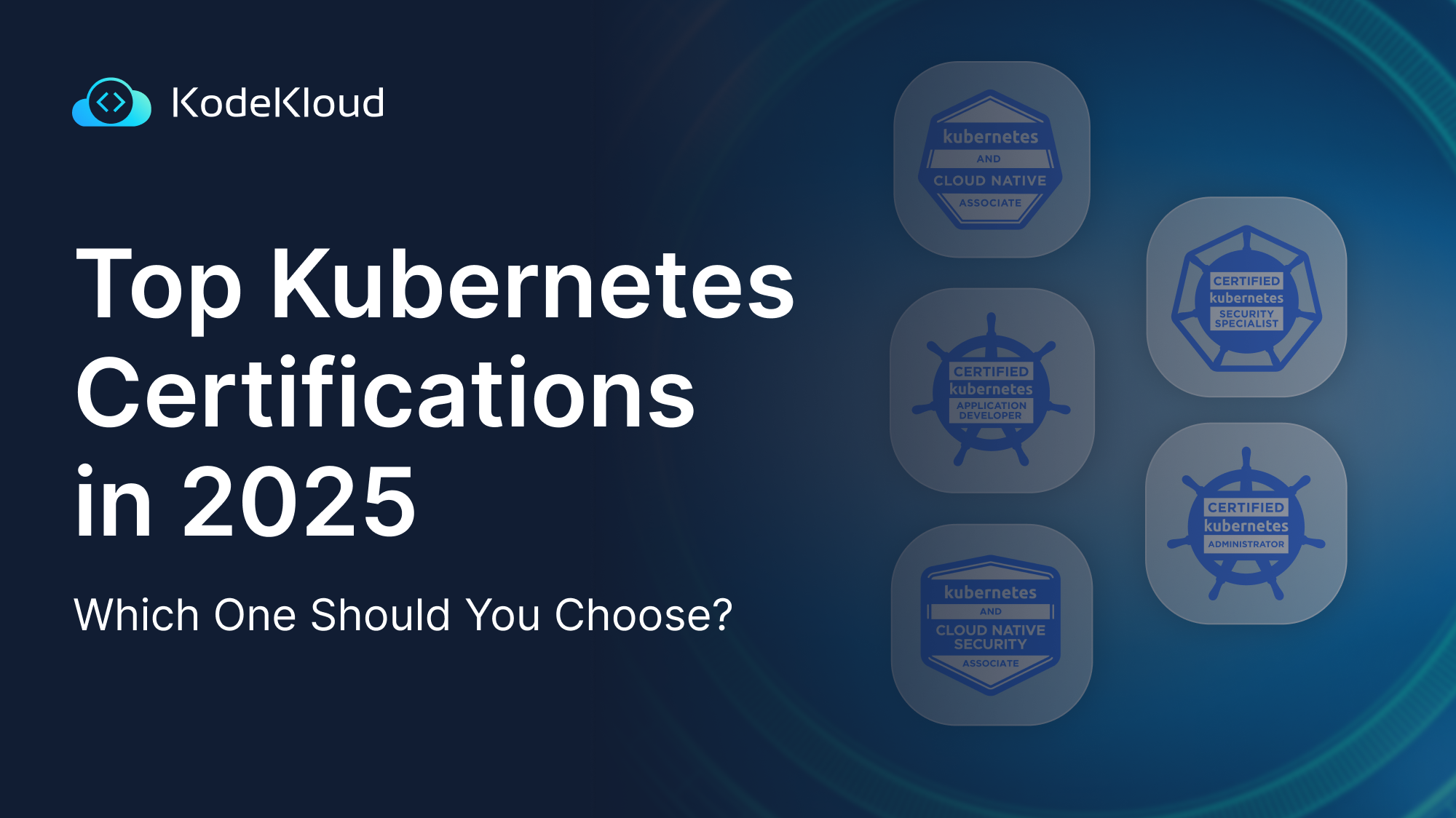
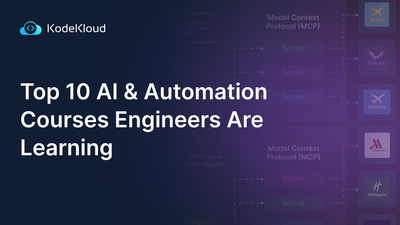
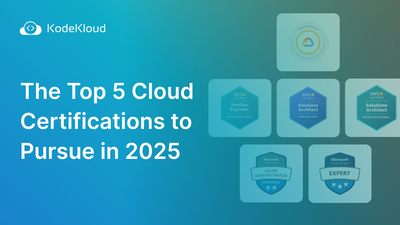
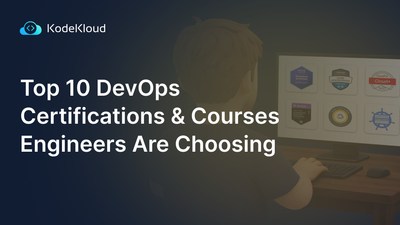



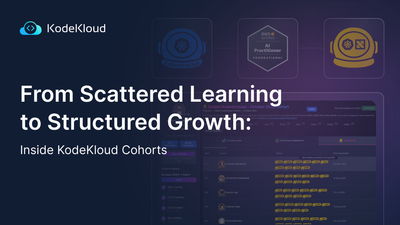
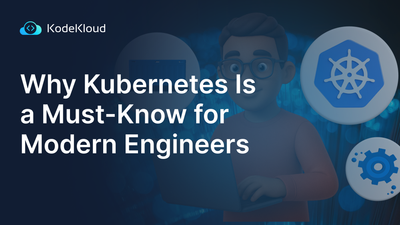

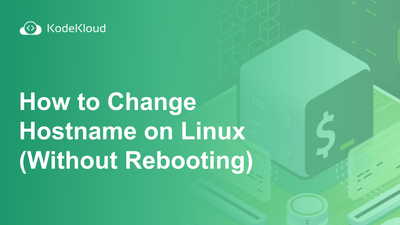

Discussion